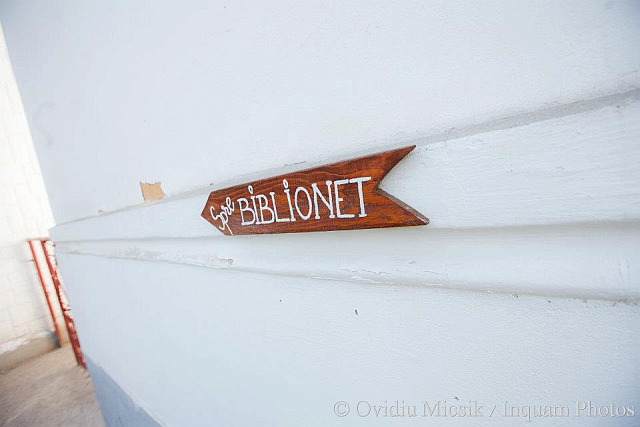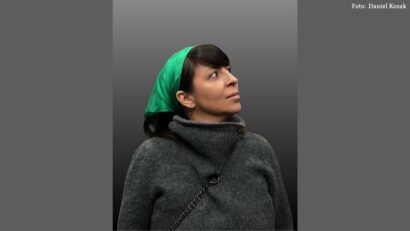Public Libraries in the Countryside
According to the latest Cultural Barometer, 47% of the Romanians read only one book per month.

Christine Leșcu, 18.03.2015, 15:00
According to the latest Cultural Barometer, 47% of the Romanians read only one book per month, either purchased in a bookshop or borrowed from a library. As such, it is well understood that the book market in Romania is not much of a moneymaker and has limited issues.
In 2013, for instance, the book market was worth 60 million Euros, in terms of total book sales, including online, while in other countries it amounts to hundreds of millions. In fact, the sale and production of e-books is the only area growing in the last few years; if people bought in bookstores one book a year on an average, they buy ten books online.
As many people invoke prohibitive prices as the reason they don’t buy books, public libraries could be the perfect alternative. Unfortunately, that is not exactly true. A lot of those have closed down, especially in the countryside. Over the last few years, their number has dropped from 3,300 to 3,000. The question arises, what should be done to bring back people to libraries, especially in full digital revolution? Romania’s National Library is trying to do something about it with its new program, Biblionet. Claudia Serbanuta is general manager of this institution.
Claudia Serbanuta: “Biblionet is a project we started in Romania 7 years ago, funded by the Bill and Melinda Gates Foundation, managed in Romania by IREX, an NGO. This project provides 2,200 rural libraries with computer equipment. The local administration simply had to apply for this program and to set aside a dedicated area within the library, appropriate for this kind of activity. They also had to provide the Internet connection. Surprisingly, not all local administrations hurried to take part in the program, but 2,200 libraries out of 2,800 is a good percentage. The Biblionet project also trained librarians in handling the equipment and help others use it.”
Even though it originated in the NGO sphere, the Biblionet program was taken over by the National Library, which manages it with good results to this day, as
Claudia Serbanuta: “The number of visitors this year went up, and more than that, services have diversified. Before the implementation of Biblionet, some libraries could barely provide a reading room and some old books. Once computers came in, the number of visitors increased considerably, visitors who didn’t necessarily come for reading, as much as for training. From 2011 to 2014, in as few as 400 of these libraries, 116,000 farmers have submitted their online applications for farming subsidies.”
The over 2,000 rural libraries in the Biblionet program have become ‘true community labs’, as EuroMP Renate Weber put it after visiting them, invited by the National Library in collaboration with the Biblionet Program and the initiative titled ‘Public Libraries 2020’, run by the Dutch Reading & Writing Foundation. Renate Weber went to Marpod and Avrig, towns in Sibiu County, and was impressed by what she found there.
Renate Weber: “These libraries have become effective labs for all sorts of community projects. In Avrig, for instance, I’ve seen a self-organized group of kids who download theater plays, adapt them and stage them. They do all that by themselves. They have 12 short plays already in their repertoire. At the same time, they have the senior group who want to preserve local traditions and gather at the library to teach the kids how to weave and spin. They also set up here the Animal Husbandry Association, which meets in the library and can have access to information. The library is also the venue for local council meetings, because both in Marpod and in Avrig the local authorities have been very open. Here you can have foreign language courses, at no additional cost, because people from the community come and teach others a foreign language they know, with the limitations that that implies. The libraries have become a sort of community engine.”
These community engines still need money to run. Some can come straight from EU institutions, if accessed properly.
Renate Weber: “Even if matters of culture and education in the EU are not regulated at the level of the union itself, and run under the principle of subsidiarity, in reality the EU can target funds at these areas. My wish is to make sure, when the European Parliament debates the annual budget, that funds are available for Romania to access for public library refurbishing.”
The National Library and the local authorities, to the extent they wish to, could be involved in preparing librarians for the new roles they play in community labs.
Claudia Serbanuta: “80% of public libraries in Romania are in the countryside, a very large percentage. Most librarians work in small communities, with specific needs. The National Library will support them to this end, as much as it can. The ball in is in the court of local administrations in terms of finding funds for vocational training projects, but they are not the alone in this process. When we invited Ms. Weber to Sibiu, it was very difficult for us to find the specific place, because we have so many successful projects all over the country. In Medgidia, for instance, we have new services, such as a support group for breast cancer survivors. It is an initiative of the local library, with no financial support. The people of the community have answered accordingly. They need more information, and don’t know where to get it. That is why the libraries have to stay within the community and turn from book depositories to institutions holding relevance for the community.”
The hope is that once people set foot in a library for whatever other purpose, they may find themselves tempted to open a book and read once again.






























